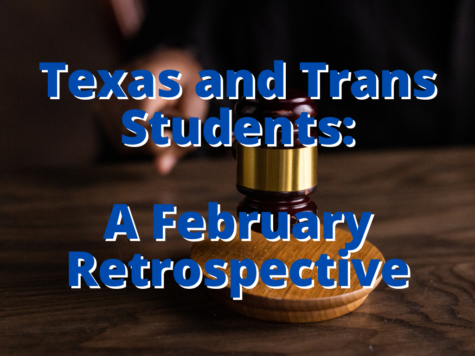Texas and Trans Students: A February Retrospective
On Feb. 22, Governor Greg Abbott sent a letter to the Texas Department of Child Protective Services with a directive to enforce the legal opinion of Texas Attorney General Dan Paxton to categorize some gender-affirming healthcare options as child abuse.
The letter began, “Consistent with our correspondence in August 2021, the Office of the Attorney General (OAG) has now confirmed in the enclosed opinion that a number of so-called ‘sex change’ procedures constitute child abuse under existing Texas law. Because the Texas Department of Family and Protective Services (DFPS) is responsible for protecting children from abuse, I hereby direct your agency to conduct a prompt and thorough investigation of any reported instances of these abusive procedures in the State of Texas.”
The letter also referenced the role of mandated reporters, which includes school staff such as teachers and counselors, in reporting suspected abuse.
“Texas law imposes reporting requirements upon all licensed professionals who have direct contact with children who may be subject to such abuse, including doctors, nurses, and teachers, and provides criminal penalties for failure to report such child abuse,” the letter continued.
However, such investigations and reports were halted by district judge Amy Clark Meachum on March 11, as Judge Meachum issued an injunction that Abbott’s actions unconstitutional pending an appeal.
In the court order that issued the injunction, Judge Meachum stated that trans children in Texas potentially, “face the imminent and ongoing deprivation of their constitutional rights and the stigma attached to being the subject of a child abuse investigation.”
Despite Abbott’s directive lacking enforceability pending further litigation, the event still spurred a lot of anxiety amongst transgender students at Cypress Creek.
“The events have me a little scared to be as open as I am within the school. I don’t really see how it’s going to help anything, schools should be supporting and helping students. Not outing and reporting,” said freshman Maddox Rayne.
There was quite a bit of frustration in the students as well.
“It was a slap in the face,” said sophomore Aeon Street. “I never thought that I would have to be worried about being who I was, and the fact it came from people who were supposed to ensure my safety made it worse.”
It didn’t just affect the lives of the students either.
“It had a huge impact on my family,” Street said. “I was forced to open up to my family about my identity and especially with the bill, I felt stuck between a rock and a hard place. If you would have told me in freshman year that I would have to worry about my safety in the people I trust most I would have called you insane, but I guess the situation itself is insane.”
Trans students also reported feeling more nervous about being themselves in school.
“It’s definitely affected the way I’ve acted in school,” Rayne said. “Usually, I’d be talking about trans rights and trans laws in my debate class, and now I’m a little scared to.”
Referring to the language in Abbott’s letter that mandated reports could potentially be implicated in enforcing Paxton’s directive, some students expressed concern.
“I’m scared about coming out and telling teachers my preferred name, and it scares me because it can allow teachers to have blackmail on students which I don’t think the governor thought about when he made the bill,” Street said. “The bill almost feels like it’s more of a weapon to be used than a shield for protection.”
Pending a July hearing and a later trial, Paxton’s non-binding opinion is not law, and the initial investigation has been halted.
Despite recent anxieties, Street still feels accepted within the student body at Creek.
“The students here are anything but homophobic and even when someone is, there is an army ready to help anybody who is threatened like that,” Street said.
However, Rayne has had a different experience.
“I don’t really feel accepted in school,” Rayne said. “There’s definitely some interesting conversations I’ve heard not just about the trans community but about the entire LGBT community in general. I do feel like there would be an outing and joking around with some of the students here if I was still as or even more open.”
Acceptance and support, socially and legally, is an overarching concern among LGBT students. The question is which should stakeholders focus on first: social acceptance itself, or the legal precedents that build it?
Cypress-Fairbanks ISD’s Student Code of Conduct defines bullying as, “a single significant act or a pattern of acts by one or more students directed at another student that exploits an imbalance of power and involves engaging in written or verbal expression, expression through electronic means, or physical conduct.” Any student who has experienced or witnessed bullying should report it immediately to a teacher, counselor, assistant principal, principal, or other district employee. Similarly, district employees should report suspected bullying to their principal. Anonymous reports can be made using the Cy-Fair Tip Line.








